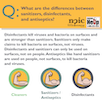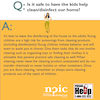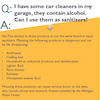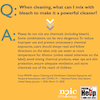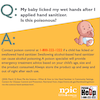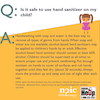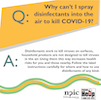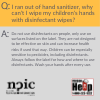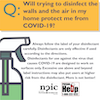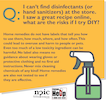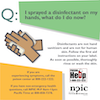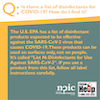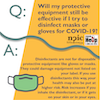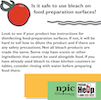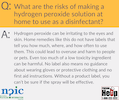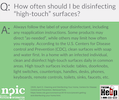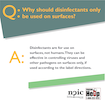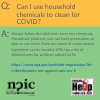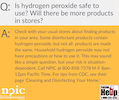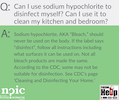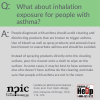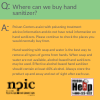This page was written as a collaboration between the National Pesticide Information Center, the Virginia Poison Center, the Oregon Poison Center, and the American Association of Poison Control Centers. To download and share full-sized images, click on the picture next to each question.
Disinfectants kill viruses and bacteria on surfaces and are stronger than sanitizers. Sanitizers only make claims to kill bacteria on surfaces, not viruses. Disinfectants and sanitizers can only be used on surfaces, not on people. Antiseptics like hand sanitizers are used on people, not surfaces, to kill bacteria and viruses.
Contact time is the time a surface must stay visibly wet with the disinfectant to be effective against the virus. Contact time changes between products, so always follow the label closely. You may also need to preclean surfaces or wipe down with water after you are finished. All of these instructions are important for the disinfectant to work correctly. Follow the label closely!
It's best to leave the cleaning to the adults in the house. Young children are a high risk for poisonings from cleaning products. Young children imitate behavior and will want to assist you in chores. Give them tasks that do not involve cleaning such as organizing toys or folding their clothes. It is advisable that parents practice safe cleaning as well. When cleaning, never leave the cleaning product unattended and do not transfer chemicals to water bottles or other containers. Remember, when finished cleaning to always store cleaning products out of the reach of children.
No. The alcohol in these products is not the same found in hand sanitizers. Misusing the following products is dangerous and can be life threatening:
- Antifreeze
- Chafing fuel
- Household or industrial products and disinfectants
- Lighter fluid
- Paint thinner
- Solvents
- Windshield washer fluid
Misusing these products can cause serious burns to the eyes, skin, mouth, throat and stomach. Answers provided by the Michigan Poison Center.
Please do not mix any chemicals. Some combinations can be very dangerous. To reduce improper use and prevent unnecessary chemical exposures, users should always read and follow directions on the label, only use water at room temperature for dilution (unless stated otherwise on the label), avoid mixing chemical products, wear eye and skin protection, ensure adequate ventilation, and store chemicals out of the reach of children.
From MMWR report: Cleaning and Disinfectant Chemical Exposures and Temporal Associations with COVID-19 — National Poison Data System, United States, January 1, 2020–March 31, 2020.
Contact poison control at 1-800-222-1222 if a child has licked or swallowed hand sanitizer. Swallowing alcohol-based hand sanitizer can cause alcohol poisoning. A poison specialist will provide emergency treatment advice based on your child’s age, size and the product consumed. Always store the product up and away and out of sight after each use.
Retrieved from: Hand Sanitizer Facts, Centers for Disease Control and Prevention, March 3, 2020.
Hand-washing with soap and water is the best way to remove all types of germs from hands. When soap and water are not available, alcohol-based hand sanitizers may be applied to children’s hands by an adult. Effective alcohol-based hand sanitizer should contain at least 60% alcohol. Children should be supervised at all times to ensure proper use and prevent swallowing. Put enough sanitizer on hands to cover all surfaces and rub hands together until they feel dry (about 20 seconds). Always store the product up and away and out of sight after each use.
Retrieved from: Hand Sanitizer Guidelines and Recommendations, Centers for Disease Control and Prevention, April 13, 2020.
Disinfectants work to kill viruses on surfaces, household products are not designed to kill viruses in the air. Using them this way increases health risks for you and those nearby. Follow the label instructions carefully for where and how to use disinfectants of any kind.
Do not use disinfectants on people, only use on surfaces listed on the label. They are not designed to be effective on skin and can increase health risks if used that way. Children can be especially sensitive to pesticides, including disinfectants. Always follow the label for how and where to use disinfectants. Wash your hands after every use.
Always follow the label of your disinfectant carefully. Disinfectants are only effective if used according to the directions. Disinfectants for use against the virus that causes COVID-19 are designed to work on surfaces only. Excessive use above and beyond label instructions may also put users at higher risk from the disinfectant. More is not better!
Home remedies do not have labels that tell you how to use them, how much, where, and how often. This could lead to overuse and harm to people or pets. Even too much of a low toxicity ingredient can be harmful. No label also means no guidance about wearing gloves or protective clothing and no first aid instructions. Never mix cleaning chemicals of any kind! Home remedies are also not tested to see if they are effective.
Disinfectants are not hand sanitizers and are not for human skin. Follow the first aid
instructions on your label. As soon as possible, thoroughly rinse or wash the skin. If you are experiencing symptoms, call the poison center at 800-222-1222. If you have non-emergency health questions, call NPIC Monday-Friday 8am-12pm (PT) at 800-858-7378.
The U.S. EPA has a list of disinfectant products expected to be effective against the SARS-CoV-2 virus that causes COVID-19. These products can be used on surfaces only, not on people. It’s called
"List N: Disinfectants for Use Against SARS-CoV-2". If you use a product from this list, follow all label instructions carefully.
Disinfectants are not for disposable protective equipment like gloves or masks. They could damage equipment not listed on your label. If you use disinfectants this way, your health may also be put at higher risk. Risk increases if you inhale the disinfectant, or if it gets on your skin or in your eyes.
According to the FDA, there is no evidence that COVID-19 is transmitted on food or food packaging. Regular steps to prevent foodborne illnesses include rinsing all produce under running water (even berries!) to remove dirt and bacteria. Scrub firm produce with a clean brush. Never use disinfectants directly on food.
Look to see if your product has instructions for disinfecting food-preparation surfaces. If not, it will be hard to tell how to dilute the product and if there are any safety precautions. Not all bleach products are made the same. Some may have scents or other ingredients that cannot be used alongside food. If you have already used bleach to clean kitchen counters or tables, consider rinsing with water before preparing food there.
Hydrogen peroxide can be irritating to the eyes and skin. Home remedies like this do not have labels that tell you how much, where, and how often to use them. This could lead to overuse and harm to people or pets. Even too much of a low toxicity ingredient can be harmful. No label also means no guidance about wearing gloves or protective clothing and no first aid instructions. Without a product label, you can’t be sure if the spray will be effective.
Always follow the label of your disinfectant, including any reapplication instructions. Some products may direct “as-needed”, while others may limit how often you reapply. According to the U.S. Centers for Disease control and Prevention (CDC), clean surfaces with soap and water first. In a home with an infected individual, clean and disinfect high-touch surfaces daily in common areas. High touch surfaces include: tables, doorknobs, light switches, countertops, handles, desks, phones, keyboards, remote controls, toilets, sinks, faucets, etc.
Retrieved from: When and How to Clean and Disinfect Your Home, Centers for Disease Control and Prevention, April 2, 2020.
Disinfectants are for use on surfaces, not humans. They can be effective in controlling viruses and other pathogens on surfaces only, if used according to the label directions.
Check with your usual stores about finding products in your area. Some disinfectant products contain hydrogen peroxide, but not all products are made the same. Household hydrogen peroxide may not have precautions or how to use it. This may sound like a simple question, but your risk is situation-dependent. Call NPIC at 800-858-7378 M-F 8am-12pm PT. For tips from CDC, visit
'When and How to Clean and Disinfect Your Home'.
Sodium hypochlorite AKA "Bleach" should never be used on the body. If the label says "disinfect," follow all instructions including what surfaces it can be used on. Not all bleach products are made the same. According to the CDC, some may not be suitable for disinfection. See CDC's page
'When and How to Clean and Disinfect Your Home'.
People diagnosed with asthma should avoid cleaning and disinfecting products that are known to trigger asthma. Use of bleach (sodium hypochlorite) as well as spray products and aerosols have been known to exacerbate asthma and should be avoided. Instead of spraying products directly onto the cleaning surface, pour the cleaner onto a cloth to wipe on the surface. In some cases, it may be best to have someone else who doesn’t have asthma do the cleaning and make sure that people with asthma are not in the room.
Safe use of disinfectants and cleaning products can reduce the risk of exposure:
- Ensure the area is well ventilated by opening windows, doors and run a fan that blows air outdoors.
- Never mix cleaning products.
- Follow the 'directions for use' on the product’s label.
Respiratory Infections and Asthma – Centers for Disease Control and Prevention
Update on asthma and cleaners – Zock, et al. Curr. Opin. Allergy. Clin. Immunol. 2010 Apr; 10(2): 114–120.
Poison Centers assist with poisoning treatment advice/information and do not have retail information on hand sanitizers. Please continue to check the places you would normally buy from.
Hand-washing with soap and water is the best way to remove all types of germs from hands. When soap and water are not available, alcohol-based hand sanitizers may be used. Effective alcohol-based hand sanitizer should contain at least 60% alcohol. Always store the product up and away and out of sight after each use.
Retrieved from: Hand Sanitizer Facts, Centers for Disease Control and Prevention, March 3, 2020.
If you're experiencing a poison emergency, or need immediate assistance related to a poisoning, call 800-222-1222. For non-emergency questions about disinfectants or any pesticide-related topic, please call NPIC at 800-858-7378, or email us at npic@oregonstate.edu.
Last updated May 04, 2025

